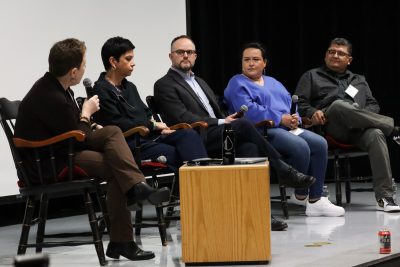At a time when the industry of journalism finds itself under scrutiny, Boston University’s Power of Narrative Conference offers solace to those navigating its uncertainties.
Nearly 400 early-career students and seasoned journalism professionals came together at the George Sherman Union March 28-29 to discuss “repairing, restoring, reconnecting” through narrative, including focuses on the freedom of the press and the great achievements of legendary writers and reporters.

“There’s a lot happening in this profession right now, and it can, at times, be demoralizing,” said Sarah Kess, associate director of The Power of Narrative and an adjunct lecturer of journalism at BU. “People need spaces like this where they can get together and talk about why they fell in love with this craft in the first place.”
The conference, now in its 27th year at BU, featured renowned journalists and authors from around the world who spoke and gave keynote lectures. Among them were senior correspondent based in Bangkok for The New York Times Hannah Beech, and former reporter and CBS Evening News anchor Connie Chung — both of whom were awarded Hugo Shong Awards from BU’s Department of Journalism.
“This is the least desirable time for us to be quiet,” Chung said in her interview with Meghan Irons, a BU professor of the practice of impact journalism. “It’s especially important for the fourth estate because we speak truth to power … and we’re the ones who tell the truth.”
Students from across North America traveled to attend The Power of Narrative conference and hear the perspectives of expert narrative journalists.
In partnership with The Sunday Long Read, several students and other young journalists had their travel and attendance fees covered through conference scholarships.
Ashley Castillo, a scholarship fellow from the Craig Newmark Graduate School of Journalism at The City University of New York, said she was “excited to meet new people and learn more about journalism.”
“The journalism thing is growing, and it’s growing into different platforms,” she said. “So [the conference] would teach me how to not only provide it to the audience, but also learn how to become a better leader.”
A central theme throughout the conference was the state of free speech and press freedom in the U.S.
“I have noticed, talking to American journalist friends, that some of the techniques that we employ particularly working in authoritarian regimes, whether it’s using Telegram, whether it’s wiping phones, whether it’s not taking phones to certain interviews … may perhaps become more relevant here,” Beech said in response to a question asked at her workshop.
While concerns about the future of journalism remained a key topic, attendees engaged in discussions on shared experiences and industry challenges.
In a profession where some work on stories alone or write as freelancers, conference-goers jumped on the opportunity to talk and share ideas with others in the field.
“So many of us, especially freelancer types like myself, are very much alone,” said Brendan O’Meara, host of the Creative Nonfiction Podcast and speaker at the event. “To be around other people, it’s just invigorating. It’s just fun to be around so many people who really appreciate non-fiction, truth-telling, writing, reporting.”
As journalism faces increasing challenges, The Power of Narrative serves as a reminder of the importance of storytelling and industry resilience.
“It’s a worthy profession because our mission as journalists is to speak the truth,” Chung said in response to an individual in the crowd asking about what to say to convince her parents to accept her career path as a journalist. “You have taught me that I must tell the truth, and I must always be credible and honest and fair. That’s journalism.”























































































































